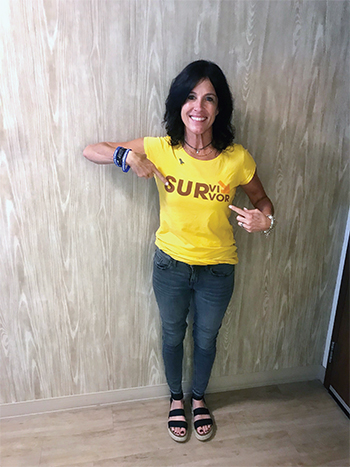Lung Cancer Survivor

Lessons Learned and Shared with Hope and Support
Jill Feldman has an especially tragic relationship with lung cancer. She lost two grandparents and her father, mother and aunt to the disease before being diagnosed at 39 with Stage IA adenocarcinoma in 2009. Today, Jill is an advocate for all facets of lung cancer research and support. Her priority is managing the disease in a way that helps her get the most out of life with her husband and four children.
Living with lung cancer in one capacity or another since I was a child has taught me a great deal about myself, my community and the disease itself. I’d like to share what I’ve learned in hopes it helps anyone who is diagnosed with lung cancer, their families and loved ones.
For patients:
Understand your diagnosis. That may include requesting a second opinion or certain tests. I found a doctor with expertise in treating lung cancer using precision medicine. I had biomarker testing and discovered that the cancer I have is epidermal growth factor receptive positive (EGFR+), which helped guide some of my treatment decisions.
Find the right physician for you. Your doctor should care about treating you as a whole person, not just treating your disease. Open and honest communication with your doctor and your health care team about what you hope to gain from treatment is crucial. I depend heavily on guidance from my medical team, and I let them know that quality of life is very important to me. My children were 6, 8, 10 and 12 when I was diagnosed. They don’t really remember a time when I didn’t have lung cancer, which is sad. On the other hand, it’s pretty amazing that treatments continue to be available because my dad died at 41 just three months after being diagnosed, and my mom died at 54, six months after being diagnosed. My doctors and I have treated my recurring lung cancer for more than a decade with surgery, drug therapy and radiation therapy, and we’ll continue to do so as long as we can. I’ve even told one of my doctors: I’m not looking for a Hail Mary. I just want to get to the next down. Enough first downs will allow medical research to catch up, and that will keep me in the game.
Reach out to the lung cancer community. Even before I was diagnosed, I became involved to raise awareness and promote change for this disease that had devastated my family. Once I was diagnosed, this huge, caring community took on a new meaning. I learned how helpful it is to have someone to guide you through this unfamiliar territory. Just imagine being dropped into a foreign country where you don’t have a map, can’t speak the language and are unfamiliar with the culture. That’s how it feels to be diagnosed with cancer. There is nothing like communicating with someone else who understands it like no one else can. Today, I help others who are newly diagnosed by being their someone to talk with to relieve anxiety and offer support.
Prepare for emotional ups and downs. There are days I feel I can conquer the world, and other days I don’t want to get out of bed. That is the reality of it. That can be hard for people who haven’t been through it to understand, which is another reason it helps to be connected with the lung cancer community.
Find an escape. Doing all the things I am supposed to, such as watching my diet and taking detailed notes of my condition, gives me a sense of control. But sometimes, that constant focus on cancer and myself becomes all-consuming, and I need a break. Some people work out or garden. I go to overnight camp every summer as a counselor. Everyone there knows I have cancer, but it’s not what I’m known for. It doesn’t define me.
For friends, neighbors and coworkers:
Don’t expect the patient to be positive all the time. Feelings are real, and they aren’t always going to be positive. Even though it is unintentional, the consequences of telling someone to be positive can be crippling. It puts the burden on them, making it easy for them to feel they didn’t try hard enough if they have progression or are wiped out from treatment.
Recognize that families, along with patients, need support. When I was first diagnosed, I worried more about my husband and children than I did about myself. Everyone in my family who’d had lung cancer had died, and it broke my heart to know how scared my family was. And, they still had everyday things to do in spite of my diagnosis. The support of our friends and family helps all of us tremendously. It’s hard for me to accept help for myself, but it’s much easier when I see how it helps my family.
Help change the mindset associated with lung cancer. When many people hear of a lung cancer diagnosis, they often ask if the person smoked. Although smoking is a risk factor for lung cancer, it doesn’t mean someone who smoked deserves to have this terrible disease. Anyone can get cancer, and it doesn’t help to judge. We should focus on support for the person, their family and more research to end this illness.
My wish for everyone:
Have hope. Not long ago, there wasn’t a lot of hope for people with lung cancer. Today, there is. I see hope from research, patient advocacy and the lung cancer community. My wish is for you to see it, too.


